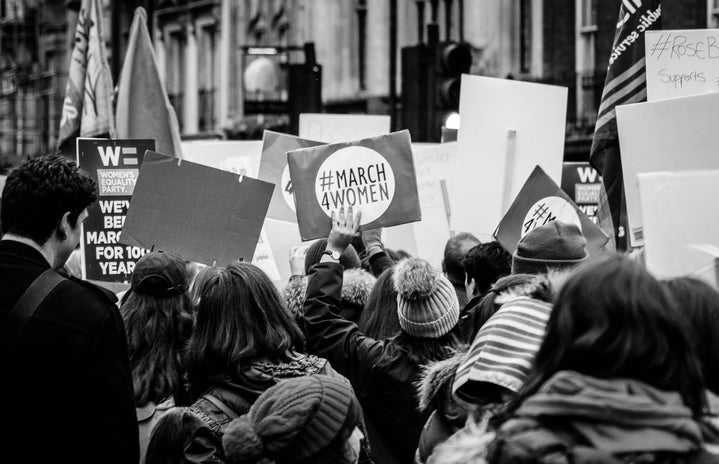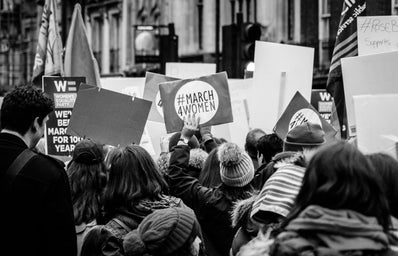As the 2022 legislative session quickly approaches, Florida lawmakers and state leaders are looking to adopt legislation that would ban women from receiving abortion services in Florida.
The push for a Florida abortion ban precipitated following the enactment of the “fetal heartbeat” legislation in Texas (SB 8). This prohibits pregnant women from receiving abortion services six weeks after gestation when medical professionals are able to detect a fetal heartbeat. The ban also allows private citizens to sue abortion providers, facilitators or anyone who abets a woman receiving abortion services. If won, the plaintiff could receive up to $10,000—which the defendant would become responsible for paying—for each successful abortion reported. The Texas legislation does not exclude situations involving rape or incest.
With the majority of UF students being female (55.65%), an abortion ban would directly impact and limit their options. According to data collected by the Florida Agency for Health Care Administration, abortions in Florida increased by 4% last year, with women aged 20 to 24 accounting for 27% of total Florida abortions. Thus, limiting access to safe abortions for college-aged women will result in a substantial amount of women resorting to unsafe procedures.
Despite the push for abortion bans in several states, the majority of Americans (59% according to a Pew Research Center poll) believe abortion should be legal in all or most cases. Utilizing abortion services is widely supported. In fact, one in four women will have an abortion in their lifetime, including individuals who align politically as Democratic, Republican or nonpartisan.
Laura Goodhue is the executive director of the Florida Alliance of Planned Parenthood Affiliates. “This should not be a partisan issue; And yet, it has become one,” she said. “Unfortunately, Republican politicians use reproductive healthcare and pregnant people as a pawn to gain political favor.”
Goodhue addressed the monopolization of time that abortion legislation causes during legislative sessions. The state legislature meets for 60 days to address issues in Florida. “When an abortion bill is heard in the health care committee, it takes up the entire time, because it is such a heated, emotional issue,” Goodhue explained. Abortion ban discussions would become priority “instead of dealing with the real health issues in our state, in particular, the Delta variant of COVID-19, which has killed almost fifty thousand people in the state,” she said.
Depreciation of Education Resources
In June, Governor Ron DeSantis approved HB 545, which allows parents to excuse their child from receiving sexual education in school.
“If our state politicians were truly serious about ending unintended pregnancies and abortions, they would be expanding access to information, which can start at a young age and needs to go throughout high school,” Goodhue said. She stressed the importance of a medically accurate and age-appropriate sexual health education curriculum. “What we have right now is not meeting the needs,” she added.
In addition, minors in Florida are currently unable to receive abortion services without parental consent due to the passage of SB 404. Without access to sexual education and birth control, minors are more likely to resort to carrying through with a pregnancy, as they believe they have no other options. “When they do not have access to sex education, birth control and the information they need to keep themselves healthy, they have nowhere to turn,” Goodhue said.
Abortion Ban Enforcement
The Texas legislation enabled the deputization of private citizens to enforce the ban by incentivizing a minimum of $10,000 per reported abortion if successful. “This creates a system where the opposition of safe and legal abortion is now going after providers for performing legal abortions, and that would essentially shut them down,” Goodhue emhpasized. “It’s the threat—and letting it go into effect now—of this private right of action that is the most harmful.”
Impact on Marginalized Communities
Furthermore, an abortion ban would disproporitonately impact marginalized groups, as the healthcare system already presents barriers to these communities. “Historically, they [Black and Latino communities] have higher rates of sexually transmitted infections, STDs and HIV. They also have a historically higher lack of access to birth control and sexual health education,” Goodhue said. Transgender and non-binary individuals will also become disproportionately impacted by an abortion ban. Goodhue explained, “Their doctors may just not understand them or they may feel discriminated against by even going to a doctor, so they are also left out.”
Role of the Supreme Court
Not only does an abortion ban violate Roe v. Wade, which has nearly 50 years of standing, but it also proves unconstitutional under the state constitution, which guarantees a strict right to privacy to Florida citizens. “Florida State Supreme Court has upheld those rights when the state has tried to pass abortion restrictions that have stood in other states,” Goodhue added.
The Supreme Court has the authority to appeal legislation from passing at the state and local level; however, given the Supreme Court’s refusal to block the abortion ban in Texas (5-4), opposing forces fear there are limited options and protections for states like Florida.
The State Supreme Court in Florida has three new justices appointed by Governor Ron DeSantis, who has previously expressed interest in passing abortion regulations. “These are the justices that he appointed who we know have a background in not supporting reproductive health and rights… which is very concerning,” Goodhue said.
Growing Opposition
The Texas abortion ban gained widespread backlash and mobilized campaigns opposing copycat legislation.
Several Gainesville and North Central Florida organizations have amalgamated to encourage citizens to fight the abortion prohibition. Among the opposing forces are the National Women’s Liberation Gainesville Chapter, Women’s March Florida Gainesville and Ocala Chapter, North Central Florida Indivisible and North Central March for Reproductive Rights and Justice. These groups are currently hosting the North Central Florida March for Reproductive Rights and Justice on Oct. 2 at 3 p.m. to protest the proposed Florida abortion ban. More information regarding the location and other updates can be found on the event page.
https://womensmarch.com provides a digital map of marches occurring nationwide that are scheduled for Oct. 2.
Goodhue encourages people to become involved. “Now is the time. This is an actual real threat that they could ban abortion for half of the country.”



